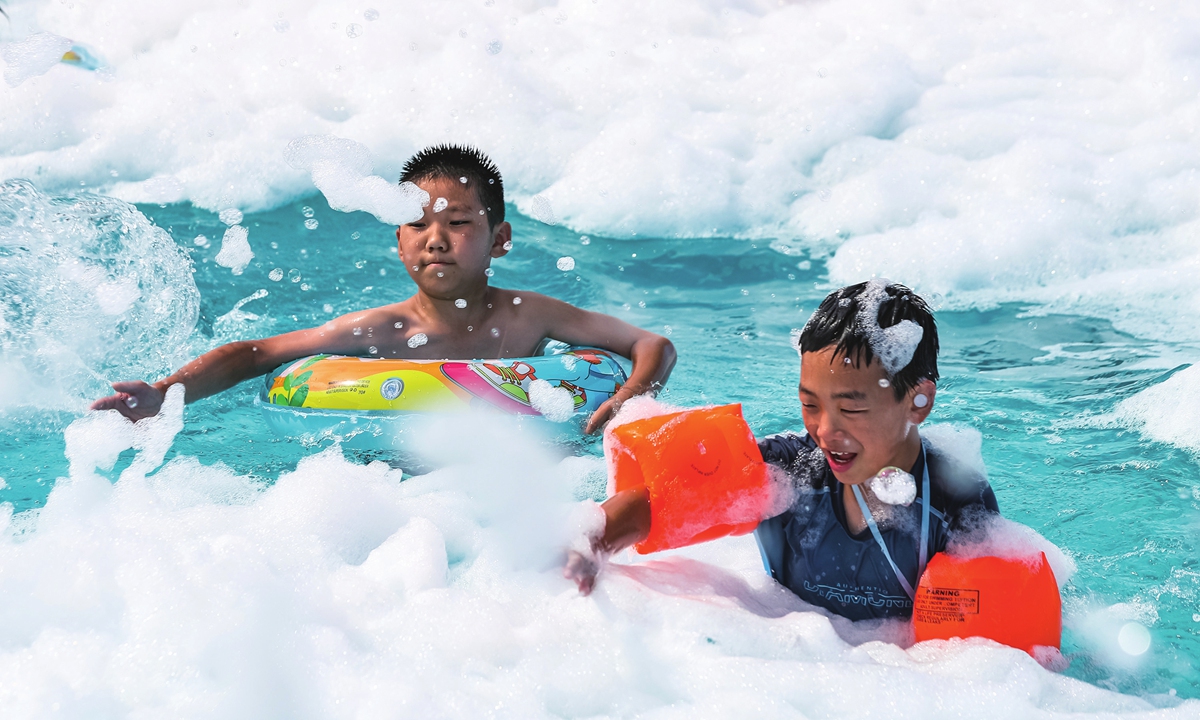
 i_need_contribute
i_need_contribute

Tourists cool off in the water in Du'an, South China's Guangxi Zhuang Autonomous Region, on July 5, 2025. Photos: VCG
Many provinces in China saw temperatures soar past 40 C on Tuesday and Wednesday, with some areas breaking historical records for the same period, according to Xinhua News Agency. As a consequence, the lingering nighttime heat has made falling asleep increasingly difficult for residents.
Both online and offline discussions around the topic of "cooling down and sleeping better" have surged in popularity, with natural, low-cost methods becoming a favored approach among young people to cope with "hot summer nights."
"This reflects a growing awareness of holistic health and shows that today's younger generation is actively seeking natural yet scientifically informed ways to regulate their well-being," Luo Chaofan, a certified physical therapist with China's National Health Commission, told the Global Times.
From a modern medical perspective, the optimal temperature for falling asleep is between 22 C and 25 C. When the ambient temperature rises above 28 C, the body must sweat continuously to maintain a stable internal temperature. This keeps the sympathetic nervous system in a state of heightened activity, which can lead to fluctuations in blood pressure and metabolic imbalance, reducing the duration and quality of deep sleep, according to Guangming Online.
"Seasonal sleep problems are primarily caused by high temperatures and often manifest as difficulty falling asleep and frequent night wakings, though symptoms are generally mild," Luo noted.
Recently, a folk method of cooling down for better sleep - hugging winter melons, has gone viral on social media. A search for "sleeping while hugging a winter melon" yields numerous user posts, with many even encouraging their children to try it.
Liu Baoli, deputy director of the Beijing Hospital of Traditional Chinese Medicine affiliated with Capital Medical University, explained in an interview with CCTV.com that when the cold surface of a winter melon comes into contact with areas like the abdomen or arms, its cooling properties are transferred through the skin, helping to dispel internal heat.
However, Liu also noted that this method may not be suitable for everyone. People who have a weak constitution, are sensitive to cold, or have sensitive skin should avoid using it.
In addition to popular physical cooling methods like hugging winter melons, many young people are turning to traditional Chinese medicine (TCM)-inspired remedies for better sleep. These approaches offer a gentler and more sustainable way to cope with summer insomnia, emphasizing the balance of both body and mind.
One widely recommended method is the use of herbal pillows, which have become a new favorite for those seeking natural and non-invasive ways to sleep better.
The preparation is simple: combine 100 grams of dried lotus leaves, 50 grams of chrysanthemum, and 50 grams of light bamboo leaves, then place the mixture into a breathable cotton or linen pillowcase. Each of these three herbs plays a distinct role: lotus leaf helps clear heat and relieve summer dampness, chrysanthemum soothes the liver and brightens the eyes, and light bamboo leaf guides internal heat downward from the heart. Together, they work to ease the sensation of heat around the head and neck, helping users feel cool and calm as they rest, according to Guangming Online.
Sun Boyuan, a Beijing-based physician, told the Global Times that herbal pillow use should take individual sensitivities into account. "People with pollen allergies or respiratory sensitivities should choose herbs that do not irritate their systems," he advised.
"Rather than blindly chasing 'coldness,' traditional Chinese medicine emphasizes the principle of 'clearing without damaging yang energy, and cooling without harming the body,'" Sun explained.
In parts of southern China, especially the Lingnan region, this kind of balanced, inside-out approach to wellness remains an important part of the traditional lifestyle for many people. For example, a lot of residents of South China's Guangdong Province continue the custom of drinking herbal cooling tea in the summer, believing it to be more effective than chilled beverages.
"I've been drinking liangcha [cooling tea] since I was a kid, especially in this kind of hot and humid weather," Zhao Yafeng, a photographer from South China's Guangdong Province, told the Global Times.
"The one I usually drink is brewed by an old local herbal shop in my hometown. It has a strong earthy taste, but it helps me feel lighter, and I sleep better without tossing and turning," she added.

Children play in the water to cool off in Zhenjiang, East China's Jiangsu Province, on July 9, 2025.
These days, outdoor fountains, misting devices, and water-themed parks have become popular spots for young social media users seeking a break from the heat. These interactive cooling spaces offer both relief and entertainment.
As evening breezes rise, city squares and waterside areas are often filled with young people and children splashing barefoot, dancing through fountains, and chasing mist, turning a simple outing into a moment of playful escape from the sweltering indoors.
"Water is a very natural mood regulator. It not only lowers body temperature but, more importantly, offers sensory relaxation," Sun told the Global Times.
According to Sun, when people come into contact with water, their skin senses the cooling stimulus, prompting the nervous system to adjust blood flow and achieve a balance between body and mind.
"Many of us can't fall asleep because our minds are too tense and restless," he said. "Even just sitting by a water feature after work and listening to the sound of flowing water can help 'empty the mind' and create favorable conditions for sleep."